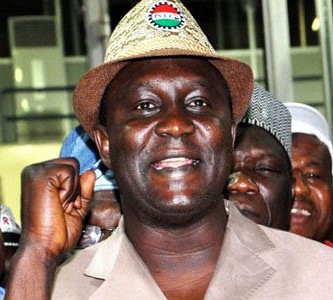The Nigeria Labour Congress has threatened a nation wide protest across the 36 states of the federation over the planned hike in Premium Motor Spirit popularly known as patrol.
The rally scheduled to take place January 27, 2022, with a nationwide protest for February 1st 2022 are meant to reject in strong terms and also put straight the position of labor over federal government’s planned petroleum products hike.
The President Nigeria Labor Congress, Comrade Ayuba Wabba disclosed this in Abuja at the opening ceremony of the
National Executive Committee Meeting.
Ayuba added that the protests would kick off instantly and without notice in all the 36 states if the government goes ahead to increase fuel before the planned January 27 nationwide rallies.
“Pursuant to its rejection and resistance of further increase in the price of petrol, to organize Protest Rallies in all the 36 States of the Federation on 27th January 2022 which would culminate in the submission of protest letters to all the 36 State Governors. Subsequently, a National Protest will take place on 1st February 2022 in Abuja; and
“In case government decides to announce new petrol prices before the proposed protests, the protest will kick off instantly and without any other further notice in every state of the federation and the Federal Capital Territory,” the NLC said in a Communique signed by its President, Comrade Ayuba Wabba and Secretary – General, Emmanuel Ugboaja.
It urged the government to adopt effective economic policies to halt the inflationary trend as it presents additional pressure on the lean income of Nigerian workers and other citizens and has made life terribly unbearable for the poor masses of our country.
On the issue of insecurity, the NEC lamented that the crises of insecurity in Nigeria has continued to deteriorate since its last meeting and that the parlous state of insecurity apart from scaring away potential local and foreign investors from the Nigerian economy has also unleashed an unquantifiable social dislocation and crisis in the country including food insecurity, widespread hunger and mass destitution.
The meeting therefore urged the Federal Government to consider the recommendations and policy initiatives gleaned from the NLC National Summit on Peace and Security and National Roundtable on Social Protection Cover in developing a National Plan of Action against Insecurity in Nigeria; and
Part of the communique reads: “The Federal Government should adopt a multi-stakeholder approach and innovative non-kinetic intervention model towards achieving a sustainable solution to the crises of insecurity in Nigeria.
“The Plans by the National Assembly and Nigeria Customs Service to introduce excise duties on carbonated drinks manufactured in Nigeria, NEC reasoned that such plans will only exacerbate the prevailing hyper-inflation of essential goods especially food consumables, lead to decline in sales, job losses in the food sub-sector and increased hardship for ordinary Nigerians.
“On the plans for the privatisation of Nigeria’s railways, public healthcare facilities and concession of Nigeria’s major international airports, NEC reasoned that the executive arm of government at the federal level and the National Assembly should work together with Organized Labour and manufacturers in the sub-sector for a win-win solution;
“NEC resolved that plans to privatise and concession prime national assets would be tantamount to ‘State Capture’ of the commonwealth. The NEC urged government and promoters of the privatization and concession plans to learn from the misadventure of the power sector privatization which instead of improving the lives of the ordinary Nigerian have increased the level of suffering and hardship faced by the Nigerian masses; and
“NEC therefore resolved to reject the concession of Nigeria’s four major airports and the privatization of Nigeria’s prime national assets including the Transmission Company of Nigeria and other assets billed through legislative actions for privatisation.”

